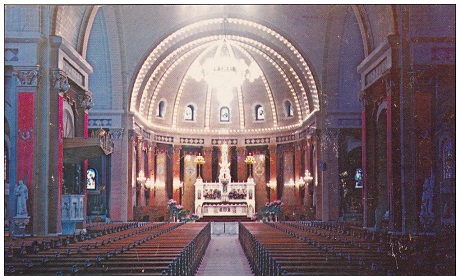About a quarter of Quebec’s Catholic churches have been closed, abandoned or converted for other use since 2000 – a trend for the fate of all churches.
Architectural historian Luc Noppen says all Quebec’s Catholic parishes “are at the end of their tether”.
“Three or four times a day, we learn of the closure of one or another”.
Of the Canadian province’s 2,746 churches in 2003, 713 have been destroyed, closed or converted, a fact shown by religious heritage council records.
The Catholic Archdiocese of Quebec City is also seeing an acceleration of church closures.
This is “due to the decrease in the number of Catholics, our resources, and the increase in maintenance costs” the archdiocese says.
Church building ownership in Quebec
Church buildings are owned by local corporations managed by the parishioners.
Over the past 40 years though, Church membership has declined significantly.
As a result, churches have been closed or sold.
Unfortunately, heritage buildings sold in good condition can end up being neglected and then – because of their progressively sorry and unsafe state – they end up being demolished.
One example of this happened in Quebec City to Saint-Cœur-de-Marie Church (pictured), “a jewel” of neo-Byzantine architecture says Noppen.
Other notable churches in the city have also been destroyed recently.
In 2020 Quebec’s auditor general, who oversees parliamentary control of public funds, denounced the province’s inaction to protect its real estate and religious heritage.
Cited were a “lack of vision and an absence of results… and coherence” that leaves municipalities to fend for themselves.
Even with additional funding, parishes can’t always continue to pay the bills and disastrous consequences follow.
If an incident occurs that requires new expenses, for instance, a parish sometimes has no choice but to close before the restoration is complete.
Ways and means
Quebec’s religious heritage council would like increased funding to better meet parish needs.
Lacking the resources to save parish buildings, cities can be tempted not to oppose demolition to allow private real estate development and thus more tax revenue.
Demolition is never the first solution considered by parishes.
Rather, they prefer to forge partnerships with municipalities so that the churches can remain open for worship while finding other functions for them, without major transformation.
But for that to happen, “support from the different levels of government is not enough”, a Quebec City archdiocese official says.
Citizens’ demands that municipalities save churches are leading to their buying places of worship to protect them.
Municipalities share of ownership has risen from 17% to 24% over nine years, while at the same time private owners’ share has risen from 17% to 24%.
They can then decide to change their use, partially or totally.
This can work well though.
In one case in a village, a former church became a rock-climbing gym and a municipal library – while still holding Masses.
In doing so, life returned to the village with the church at its centre.
Source
- La Croix
- Image: HipPostcard
News category: World.




